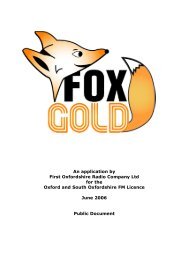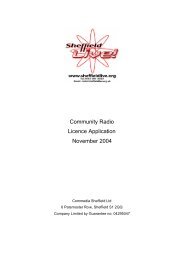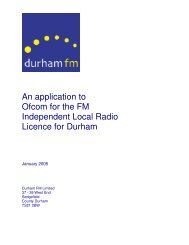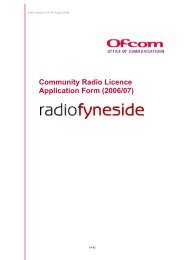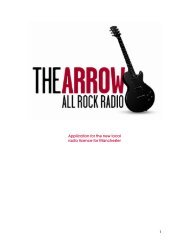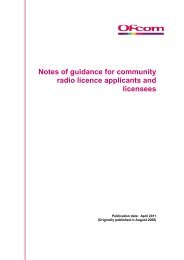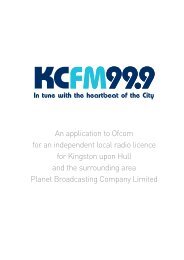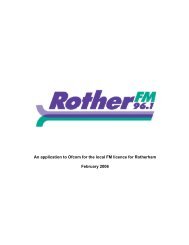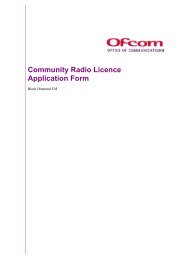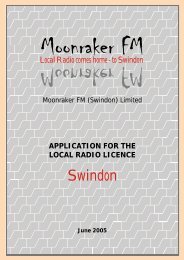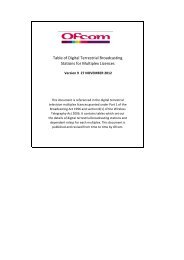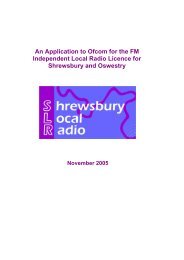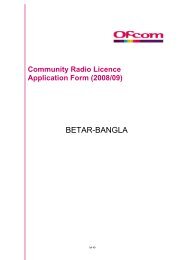Radio Plymouth - Ofcom Licensing
Radio Plymouth - Ofcom Licensing
Radio Plymouth - Ofcom Licensing
You also want an ePaper? Increase the reach of your titles
YUMPU automatically turns print PDFs into web optimized ePapers that Google loves.
RADIO PLYMOUTH<br />
Although Pirate FM had a minute’s less commercial airtime than <strong>Plymouth</strong> Sound at breakfast, it<br />
used that time to chat to the audience rather than play music.<br />
Even a station unburdened by the economic requirement to run advertising fails to capitalise on its<br />
advantage by producing the music output so demanded by the audience. Commercial broadcasters<br />
should not bemoan the approach of BBC <strong>Radio</strong> Devon, which is attempting to fulfil its public service<br />
obligations by running more expensive journalism and other speech broadcasting. Instead, we<br />
believe that ILR should capitalize on it, by meeting audience needs.<br />
Notably, the station with fewer resources than Pirate FM and <strong>Plymouth</strong> Sound, South Hams <strong>Radio</strong><br />
spends as much time on DJ banter, 11 minutes between 7 and 8 am, but plays the most music of<br />
any station in the region: almost two-thirds of airtime. Of the independent stations, it runs fewer<br />
commercials, just 7 minutes in this peak breakfast hour.<br />
The largest amount of time given to presenter banter comes in the evenings on Classic Gold, with<br />
34 minutes of speech between 9 and 10 pm, twice as much as its next chattier rival, BBC <strong>Radio</strong><br />
Devon. The locally-produced commercial stations are all running about 70% music at this time.<br />
Music<br />
Both of the commercial stations most identified by our research, <strong>Plymouth</strong> Sound and Pirate FM,<br />
played the same amount of music at breakfast. Music is the single largest item of content on both<br />
<strong>Plymouth</strong> Sound and Pirate FM, but at just 24 minutes, its less than the audience craves, if the other<br />
elements of our research are indicative of demand.<br />
<strong>Plymouth</strong> Sound plays much more music in the evenings, but most of <strong>Plymouth</strong> Sound’s music is<br />
chart or recent chart music. Oldies tend to come from the past 15 years. That <strong>Plymouth</strong> Sound is<br />
primarily a youth music station, influenced by what is being played in the clubs, is evidenced by the<br />
26 hours a week of music branded “Ministry of Sound”. Although this output fell outside our<br />
monitoring hours, dance music is also an important part of their daytime output.<br />
At drivetime, only two stations, <strong>Plymouth</strong> Sound and South Hams <strong>Radio</strong> have more than 50% of<br />
output as music. Although this is a time when traditionally more information: news and travel, are<br />
provided, we believe there is an opportunity to cut down on extraneous presenter chat to deliver a<br />
brisker, more business-like approach, to allow more music.<br />
For the three stations that we are concentrating on for <strong>Plymouth</strong>, and taking breakfast as an<br />
example, the output comparisons illustrate the main difference between what they offered listeners<br />
during this monitoring exercise compared with what <strong>Radio</strong> <strong>Plymouth</strong> plans to deliver.<br />
62



